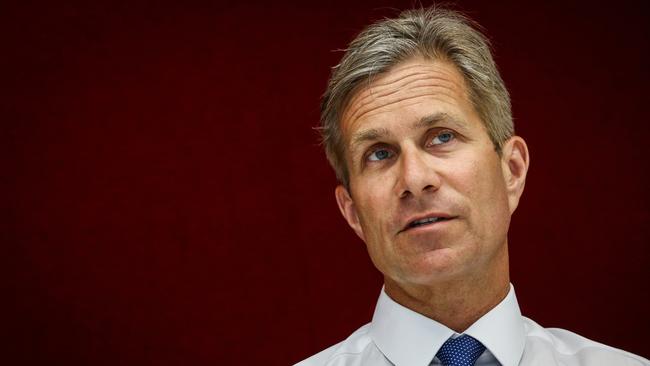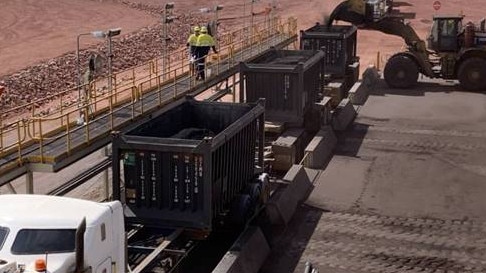Mining merger frenzy ‘just the beginning’, says ex-Sprott boss Peter Grosskopf
The most recent round of mining mergers and acquisitions is just the tip of the iceberg with the sector set to be reshaped amid a potentially record-breaking spree of corporate activity.

The most recent round of mining mergers and acquisitions is just the tip of the iceberg, according to former Sprott chief executive Peter Grosskopf, who says the sector will be reshaped over the next few years amid a potentially record-breaking spree of corporate activity.
Mr Grosskopf just led the management buyout of Sprott’s investment banking and advisory business, Sprott Capital Partners – now named SCP Resource Finance. Before leading the spin-out he was Sprott Inc’s chief executive for a decade, and is also a board member of gold major Agnico Eagle and the World Gold Council.
The 35-year industry veteran told The Australian he has rarely been as excited about the outlook for M&A in the mining industry through his career, as the solid balance sheets at the world’s biggest resource companies look set to combine with booming demand for battery-making commodities and thin development options to create a perfect storm on capital markets.
“I think there’s good days ahead for the industry because the majors trade at quite reasonable cash flow multiples now. And yet they haven’t inspired many people in terms of their potential growth of reserves or production,” he said.

This year is already shaping up as a bumper time for mergers and acquisitions in the resources sector, after BHP closed its acquisition of OZ Minerals while Newmont’s merger with Newcrest Mining is almost a done deal and Glencore edges closer to capturing Canada’s Teck Resources and spinning out both company’s coal assets.
Mr Grosskopf told The Australian the “industrial logic” of size was driving a need to compete for attention on global capital markets, pushing major mining companies to look for growth through acquisitions. “Generalist investors don’t care to own small companies. Capital markets have just got so big that in order to be relevant to a generalist investor, mining companies need to be in the $US10bn range,” he said.
“That’s driving deals to make major companies bigger. It also creates a draft in its wake – smaller companies also either getting acquired or acquiring each other and merging with each other to try and go beyond the status of single mining companies.
“The majors seem to be increasingly hungry. The intermediates are feeling vulnerable, so they’re wondering if they do their own deals to bulk up. And among the juniors, everybody is talking to everybody. I can’t see how the environment cools down. I think we’re going to potentially hit some records here.”
Of the majors, only Rio Tinto’s Jakob Stausholm has consistently indicated the company has little desire to engage in major takeovers, telling shareholders and reporters at the company’s annual shareholder meeting last week that the company intends to stick with its strategy of growth through its own internal pipeline and acquiring early-stage projects, rather than paying a premium for big acquisitions.
Rio’s most recent transaction with First Quantum Minerals – the sale of a 55 per cent stake in La Granja copper project in Peru, one of the largest undeveloped copper deposits in the world – points to another significant trend in recent mining deals, according to Mr Grosskopf.

Senior Rio executives have been happy to admit the First Quantum deal was partly done to access the Canadian company’s significant skills in building major projects in South America.
That made La Granja a smart deal for both companies ahead of the looming boom for copper around the world, Mr Grosskopf said.
“The real shortage for the whole industry is that it doesn’t have enough quality management teams,” he said.
“You can have great rocks, or you can have a great team – but the two of them need to find each other to have a real winner,” he said.
“There’s just such a shortage right now of good management teams that know how to build assets – and it’s a lot harder to build assets these days. So I just don’t see slowing down at all.”
The difficulty in building base metals mines such as copper and nickel is likely to drive corporate activity in that sector, Mr Grosskopf says, with financial uncertainty – such as the latest banking crisis in the US – helping support interest in gold.
And the desire of the world’s lithium majors – such as Albemarle, SQM and China’s Tianqi – to preserve their market share ensures a heated market for companies with projects looking to develop the battery-making material, he says.
All three majors have been active in the Australian deal-making market over the last few years, with Albemarle’s $5.5bn bid for would-be producer Liontown resources only the latest in a multi-billion investment spree in Australian lithium projects.
“The more you market a mineral the more it speaks to oligopoly style activity,” Mr Grosskopf said.
“For a lithium company to get to the stage of production and actually selling your output and being profitable, even with bullish prices like we’ve seen, it’s really hard to get there. And once they’re there, they just get snapped up,”

Mr Grosskopf said the growing pressure for growth from the capital markets was similar to that seen ahead of the 2007 mining M&A boom – with one important difference, that the big miners carry relatively little debt and have far greater capacity to extend their balance sheets.
“In 2007 to 2010 companies did a lot of deals. There was a lot of pressure to grow. But many of those deals really compromised balance sheets – and then we went into the downturn. And so you had these bloated balance sheets that had a lot of debt, and you had majors who got arguably distracted, picking up assets that were maybe not in their core areas,” he said.
“Combine that with a downturn, and the industry C-suite was absolutely punished for about four or five years. Almost every major company dismissed CEOs during that time, from 2013 to 2018. The new CEOs had a new discipline, got the balance sheets in good order, started to buy back stock and pay dividends with cash flow instead of spending it in the ground.”
That new found discipline – along with recent investment in business development teams across the sector – should stand the majors in good stead during the next round of growth through acquisition, he said.
“Now they have good balance sheets. Now the majors are quite disciplined, they don’t buy anything unless it makes good strategic sense, and unless their executive team can really wrap their arms around them and make it a better asset,” he said.
“And for those types of acquisitions, when does it stop? They could just keep going for a while here yet.”






To join the conversation, please log in. Don't have an account? Register
Join the conversation, you are commenting as Logout